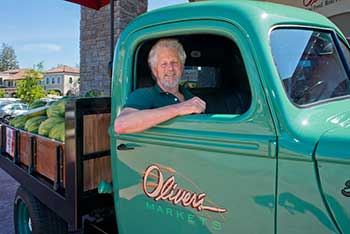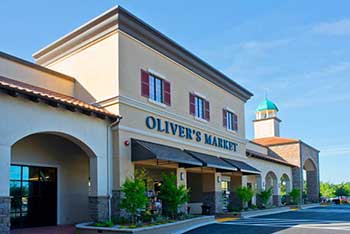Last updated on June 14th, 2024 at 09:08 am
by Alissa Marchat/staff writer
Oliver’s Market, Sonoma County’s largest locally owned and independent grocer, in early June celebrated the sale of 43 percent of the company to employees through an employee stock ownership plan (ESOP). The company also registered with the state of California as a social purpose corporation, allowing leadership to consider employees, the environment and the community in addition to financial position when making any business decision.

“I have looked at many possible scenarios for securing the future of Oliver’s in recent years, and creating an ESOP company was a great move for us,” Oliver’s Market founder and President Steve Maass said in a press release announcing the change. “We all see small, independent businesses disappear every day, and I am proud to say that we are doing everything in our power to remain local and independently run.”
The first Oliver’s Market opened in 1988 and, back then, there were plenty of independent grocers in Sonoma County. But now there are only a handful of independents left in the area, Maass told The Shelby Report.
“We are the largest independent left in Sonoma County,” he said. “Most of them sold out to bigger companies or disappeared. We just had one—G&G—who’s been here for years and years and years. (They had) two big stores they sold to Safeway.”
Founding principles paved the way
Maass, a resident of Sonoma County for more than three decades, built the Oliver’s Market business, now with four locations, from the purchase of one bankrupt store. He knew from the start he wanted his business to be about quality products and supporting the local community.
Maass began his retailing career in 1972 as the founder of Maass Produce, which operated roadside produce stands around the San Francisco Bay Area. After that, he served as the produce manager at the Santa Rosa Food4Less for a year and a half before purchasing a bankrupt supermarket that would become the first Oliver’s Market in 1988.
“I actually got a supermarket because my wife was sick with cancer, and I couldn’t afford insurance. I couldn’t get insurance unless I had 12 people. And so that was a way to get insurance,” he said. “She lived for 31 years. She was given three months, so she did really, really well…So that was a real impetus in buying a bigger store like that.”
 While Maass’ initial motivation was the insurance, Oliver’s Market was founded with five core principles in mind:
While Maass’ initial motivation was the insurance, Oliver’s Market was founded with five core principles in mind:
• Provide customers with choice: Oliver’s says it offers a proprietary blend of products, offering customers conventional and natural groceries; both conventionally farmed and organic produce options; and fresh foods, including a bakery, juice bar, hot meals, a full deli, taqueria, sushi, cheese, meats and a range of grab-and-go meal choices.
• Keep the focus local: Oliver’s carries produce, food products, and health and beauty items from more than 400 Sonoma County businesses. At the bottom of every store receipt is the total amount spent on local products so that customers can be aware of their support of local companies. Oliver’s also has been a leader in the “Go Local” movement in the region, helping to create a co-op marketing organization (Go Local Sonoma County) and commissioning an economic impact study on the community benefits of buying locally made products at a locally owned company.
• Fair prices and great quality: According to the company, its buying team and in-house food production are focused on finding the best quality and price at every turn.
• Support our community: Company leadership serves on nonprofit boards of directors, and each store donates gift cards and food to local charities and children’s sports team events. Oliver’s also participates in two large community events each year in Sonoma County: The Heart Walk and the Human Race. The company also participates in the eScrip program through Oliver’s Community Card, which allows 3 percent of every purchase to go to customers’ nonprofits of choice. More than 500 Sonoma County nonprofits are registered.
• Work to live: Oliver’s says it works to create flexible schedules for its employees and has instituted a step raise program that allows new employees to know when and how much their pay will increase if they stay committed to Oliver’s. The company also offers a wellness program, which includes special discounts on healthy foods and free smoking cessation products, among other benefits.
Those principles have served the nearly 30-year-old company well, Maass said.
“We built the company basically on being independent and local, and all our stores are in Sonoma County. They’re all within 20 minutes of each other. And they’re all doing amazingly well. In a down market when everybody’s not doing as well, we’re doing fantastic,” he said. “We’ve been profitable for all 29 years we’ve been open.”
Employees (obviously) are a priority
Not only is the ESOP the right move for the company and Sonoma County, but it’s also what’s best for Oliver’s employees—and they’ve earned it, Maass told The Shelby Report.
“The employees built this company, they really did. And I have so many employees who have been with me the whole time or close to the whole time. I really didn’t want to sell out to a national chain, although we’ve had many, many offers. It took me a long time to decide that I just didn’t want to do that. So this was a way that I could retire and make sure the business goes on and is local and independent. And it gives back to the employees, who certainly deserve it. I think it’s going to be great for the employees. Personally, I took a pretty big financial hit to do this, but it feels good to do it.”
Oliver’s now is the largest employee-owned company in Sonoma County, with more than 600 of its employees qualifying to participate in the program. The vesting program will give employees with more than 10 years of service full vesting in their allocated shares immediately, and all eligible employees who were employed at the Jan. 1 start of the program will be fully vested in three years.
The education of employees and customers will be a long-term proposition, according to the company. Oliver’s leadership plans an ongoing communications program for employee owners, and customers will see information about the change in Oliver’s marketing and store merchandising.
“We’re trying to do every week some kind of informational piece because (the program) is not really easy to understand,” Maass said. “We sent several employees already to conferences of ESOPs (to help them understand) what the benefits can be and how it works. There are a lot of rules to it.”
Though Oliver’s officially completed the filing process to become an ESOP on March 31, the lengthy reporting and auditing process means that employees will see their first account statements in late summer 2018.
Oliver’s takes community commitment a step further
In addition to launching its ESOP, Oliver’s also has registered as a social purpose corporation (SPC). The SPC designation is designed to provide companies with flexibility to pursue charitable and public purpose activities, beyond profit maximization.
“What it states is that it’s not only about the money—because we were offered so much more money for the stores than the fair market value—so that we can refuse to sell because we have other values as well,” Maass said.
The company also is considering becoming a benefit corporation, which takes the flexibility of SPCs further by mandating that companies take public benefit into consideration when making decisions. The benefits corporation designation comes with significantly more oversight. Whether Oliver’s takes that next step or not, there’s no doubt that the company’s legacy of caring for its community will continue.
*Editor’s note: This is part of a Northern California Market Profile, which appears in the August 2017 print edition of The Shelby Report of the West.






